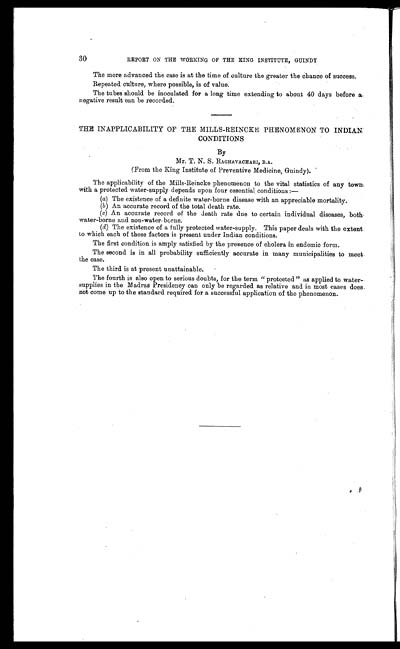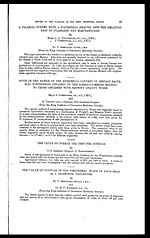Medicine - Institutions > Reports from medical colleges, schools and research institutions > Report of the King Institute of Preventive Medicine, Guindy > Reports on the working of the King Institute of Preventive Medicine, Guindy for the official year 1921-22 and the Micro-biological Section for the period from 1st January to 31st March 1921
(40) Page 30
Download files
Individual page:
Thumbnail gallery: Grid view | List view

30
REPORT ON THE WORKING OF THE KING INSTITUTE, GUINDY
The more advanced the case is at the time of culture the greater the chance of success.
Repeated culture, where possible, is of value.
The tubes should be inoculated for a long time extending to about 40 days before a
negative result can be recorded.
THE INAPPLICABILITY OF THE MILLS-REINCKE PHENOMENON TO INDIAN
CONDITIONS
By
Mr. T. N. S. RAGHAVACHARI, B.A.
(From the King Institute of Preventive Medicine, Guindy).
The applicability of the Mills-Reincke phenomenon to the vital statistics of any town
with a protected water-supply depends upon four essential conditions:—
(a) The existence of a definite water-borne disease with an appreciable mortality.
(b) An accurate record of the total death rate.
(c) An accurate record of the death rate due to certain individual diseases, both.
water-borne and non-water borne.
(d) The existence of a fully protected water-supply. This paper deals with the extent.
to which each of these factors is present under Indian conditions.
The first condition is amply satisfied by the presence of cholera in endemic form.
The second is in all probability sufficiently accurate in many municipalities to meet.
the case.
The third is at present unattainable.
The fourth is also open to serious doubts, for the term "protected" as applied to water-
supplies in the Madras Presidency can only be regarded as relative and in most cases does.
not come up to the standard required for a successful application of the phenomenon.
Set display mode to: Large image | Zoom image | Transcription
Images and transcriptions on this page, including medium image downloads, may be used under the Creative Commons Attribution 4.0 International Licence unless otherwise stated. ![]()
| Permanent URL | https://digital.nls.uk/74936447 |
|---|
| Description | 13 titles. Describes research work and conditions, treatments, vaccine production, medical education, public health and disease outbreaks. Extensive tables show mortality rates and patient admissions. These - some from asylums, jails, dispensaries, civil and police hospitals – will be useful to epidemiologists. |
|---|




![[Page 1]](https://deriv.nls.uk/dcn4/7493/74936452.4.jpg)